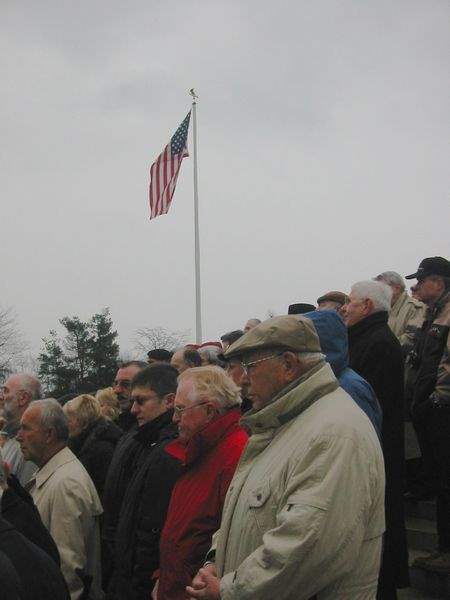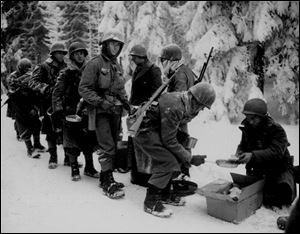
Seeing war, and memories, though a father's eyes
5/29/2005
John Chavez, a former Army private who is now a retired Air Force lieutenant colonel, visits Lorraine American Cemetery in St. Avold, France, to hear dignitaries from nearby Forbach praise surviving American veterans and U.S. soldiers killed during the liberation of the region in February, 1945.
SAINT AVOLD, France - As a chilly March rain trickled over pristine Lorraine American Cemetery, where nearly 10,500 Americans killed in World War II lie buried, I glanced across at my father and did not see the familiar face of 80-year-old retired U.S. Air Force Lt. Col. John Chavez.
For a moment, I imagined a tall, rangy, and slightly scared 20-year-old Army private shivering in a snow-covered forest and risking his life for French citizens he didn't know and whose language he didn't speak.
Sixty years ago my father, a farm boy from the sun-baked fields of Fresno, Calif., went to Europe as a "Trailblazer" - a member of the 70th Infantry Division, 276th Regiment. During four months in France, he helped liberate nearly a dozen towns and villages, was wounded twice, fought a desperate, bitter winter battle, and watched many good friends die.
And while I knew well the many stories about Colonel Chavez's air force career, which spanned two wars and 23 years until his retirement in 1970, I knew little to nothing about the life and exploits of Pfc. John Chavez, a B.A.R.-man (Browning Automatic Rifle) in first platoon, Company L, during 1944-45.
However, that changed in March when I was given the most unusual of privileges: the chance to accompany my father on a visit back to France to the former towns and battlegrounds where he fought.
Standing in the cold and rainy cemetery with its nearly endless and orderly rows of white crosses, U.S. Consul General Christopher R. Davis finally put it into perspective for me.
Across the United States, there are monuments aplenty - some sedate, others spectacular - honoring World War II veterans, he said during a speech at the cemetery.
"However, it is in coming to France," Mr. Davis said, glancing at five such veterans, their guests, and dignitaries from the nearby town of Forbach, "that veterans can truly measure the weight of their accomplishment."
Our trip to France took us to the thriving - and still deeply grateful - town of Forbach in the heart of Lorraine and within sight of the German border. It also took us to a cozy hilltop neighborhood in a nearby village called Oetingen. And lastly, it left us to wander the thick pine forests of the Vosges Mountains wrapping a sleepy Alsacian village called Wingen sur Moder, where Adolf Hitler's last gambit for victory, Operation Nordwind, was repelled by green troops of 70th division freshly arrived from America.

Pfc. John Chavez is fourth in line for a meal. He believes the photo was taken during the Vosges Mountains compaign, probably near Lichtenberg, France.
Forbach was the first stop for my father and four surviving veterans who accepted an invitation to attend the town's 60th anniversary of its liberation. People who believe the French don't like Americans have never visited Forbach.
As its mayor Charles Stirnweiss said in an emotional speech punctuating a weekend of festivities honoring former 70th soldiers, "Others may forget you, but Forbach does not forget you. Forbach will never forget you!"
As the last major French town to be liberated, Forbach rolled out the red carpet for its returning "Liberators." Rock stars don't get as much love and attention.
Throughout a three-day weekend of celebrations and ceremonies, I was stunned time and again as French citizens young and old sought out their "Liberators" for autographs, photos, interviews, accounts of their bravery, or merely to shake hands and attach a face to a long-owed thank-you.
But while the citizens of Forbach finally met some of their unknown saviors, I too met someone new: the 20-year-old wide-eyed, frightened, and heroic Private Chavez.
On a cold and crisp Sunday afternoon, father and son took a trip through time, walking the spot on a forested hill where the young private stared in disbelief as a German tank creaked up a street below and fired its weapon at his foxhole. I heard the panic and embarrassment in the old veteran's voice as he noted, sheepishly, how more sensible soldiers had left at the first sound of the approaching tank.
On a street winding up Forbach's hilly layout we found a brick wall and a house that triggered another memory: a night of comic confusion among U.S. and German soldiers. The latter casually entered the house seeking their comrades and a potato dinner they had left there earlier - only to find the house now occupied by Private Chavez and his squad. Both sides were so stunned all they could do was shout, run, and fire some scattered shots.
The town square evoked a painful memory - literally. Sixty years earlier, Private Chavez, weighted down by his heavy B.A.R. and other equipment, had run across the square but proved an easy target for a German machine gunner hidden in an archway. Shot in the head and left for dead, my father showed me the likely area where he awoke to find an elderly French couple wiping blood from his face.

John Chavez, a former Army private who is now a retired Air Force lieutenant colonel, visits Lorraine American Cemetery in St. Avold, France, to hear dignitaries from nearby Forbach praise surviving American veterans and U.S. soldiers killed during the liberation of the region in February, 1945.
Throughout the weekend I followed the ghost of Private Chavez around Forbach and the nearby village of Oetingen, and to villages of Emmersweiler and Spicheren Heights, which lie just across the German border.
From Forbach we drove to Wingen sur Moder in Alsace, where the 70th saw its first combat and earned lasting glory Jan. 3-7, 1945, when it fought and defeated a battle-hardened German 6th SS Mountain Division in the cold and snow-covered mountains surrounding the quiet, postcard-like village.
I was amazed that anyone could know who was positioned where in those thick forests, yet my father knew the precise area where his foxhole was, and recalled with lingering incredulity how "it seemed like every German had a machine gun."
Again, the ghost of Private Chavez proved a sharp guide. Tromping amidst the strategic positions of the enemy, we found many foxholes still set with logs and other concealment for machine guns. In fact, Wingen is a military collector's treasure trove with weapons and equipment still lying in spots where its owners were killed or left it.
There exist many historical photos documenting key events from that January battle when the "Trailblazers" fought their "Edelweiss" division counterparts. But the ghost of Private Chavez, a witness to those events, was able to describe to me the manner in which they unfolded and who some of those fighters were.
He also spoke of things the photos don't show - like the frequent taunts in English from the German soldiers hiding in the forest, the eerie beauty of tracer bullets arcing across Wingen's night sky, and the perpetual stink that fills the nostrils after living in a cold, muddy foxhole for five days.
The term "greatest generation" has been coined to describe America's World War II veterans and numerous monuments have been erected, films produced, and books written to give succeeding generations some inkling of what my father and others like him did to earn that title.
But Mr. Davis, the consul general based in Strasbourg, France, had it right. What made the "greatest generation" great cannot truly be understood in this country. One must go to France where the noble sacrifices a disappearing generation made in their youth still come up large 60 years later.
I went to France, and now I understand.
Contact Jon Chavez at: jchavez@theblade.com or 419-724-6128.